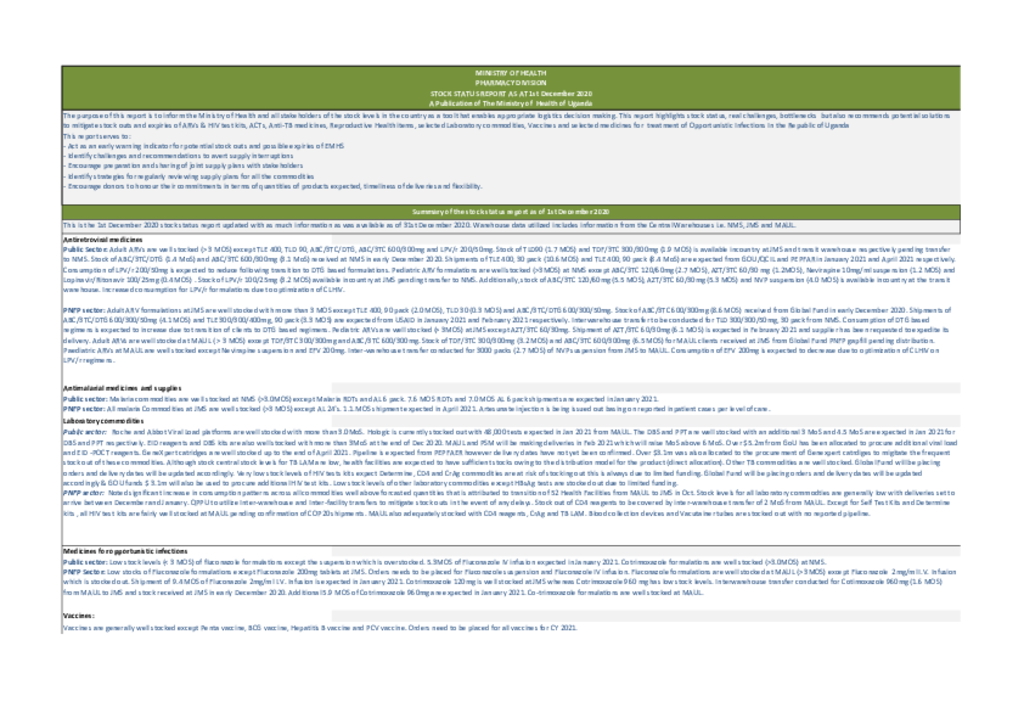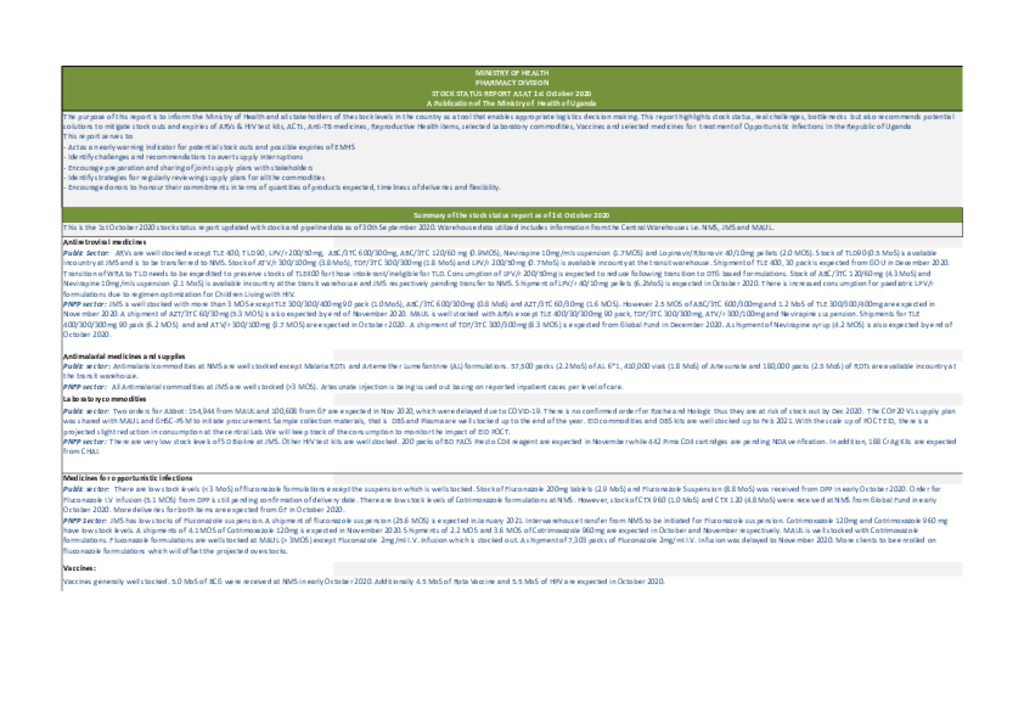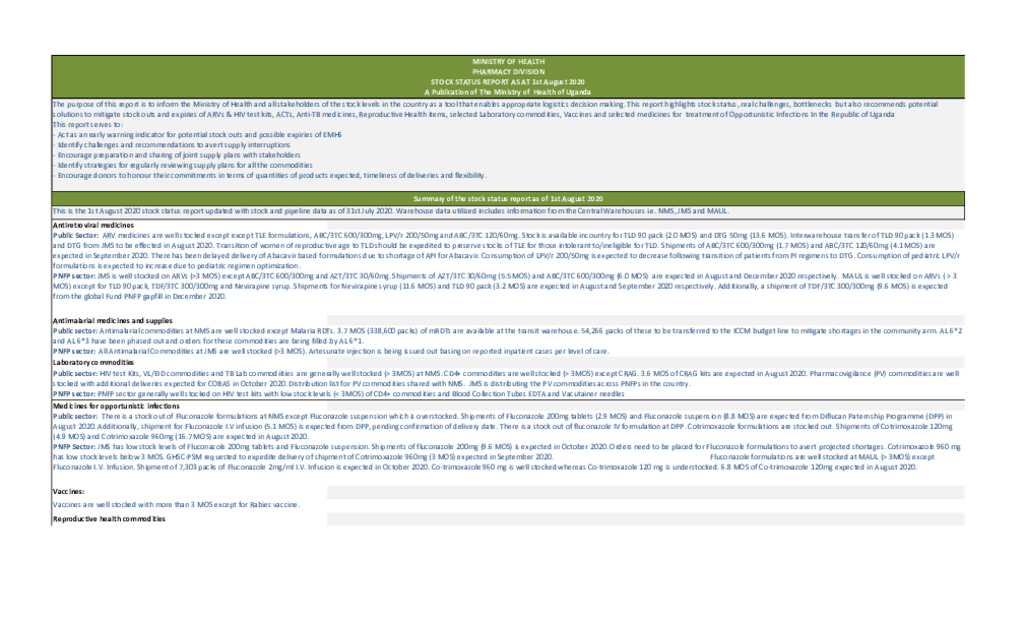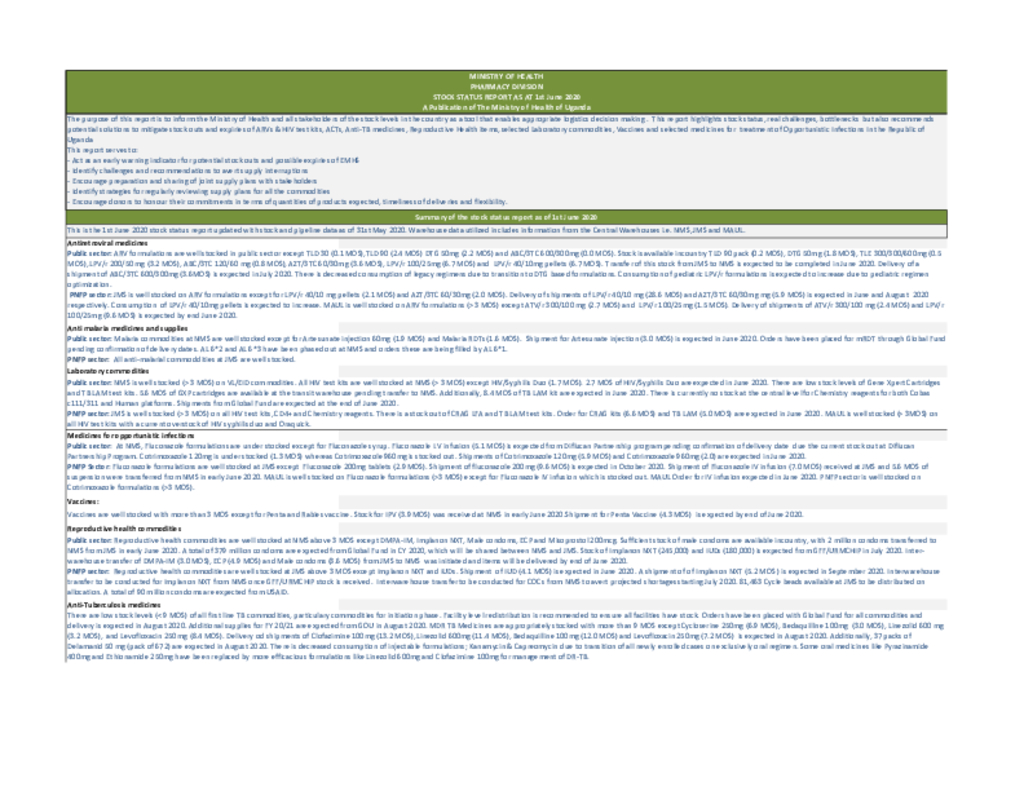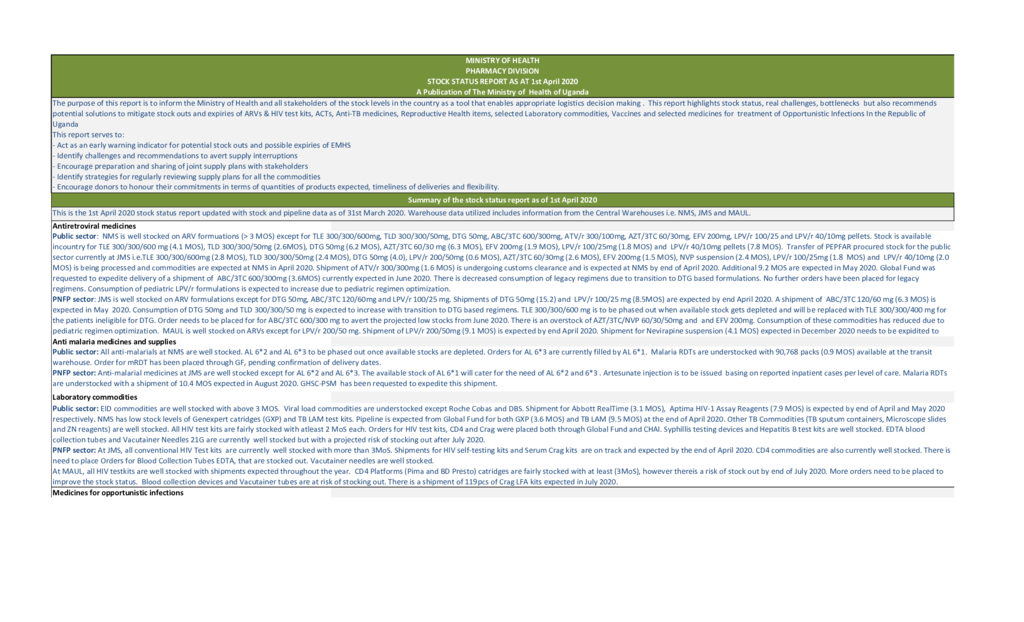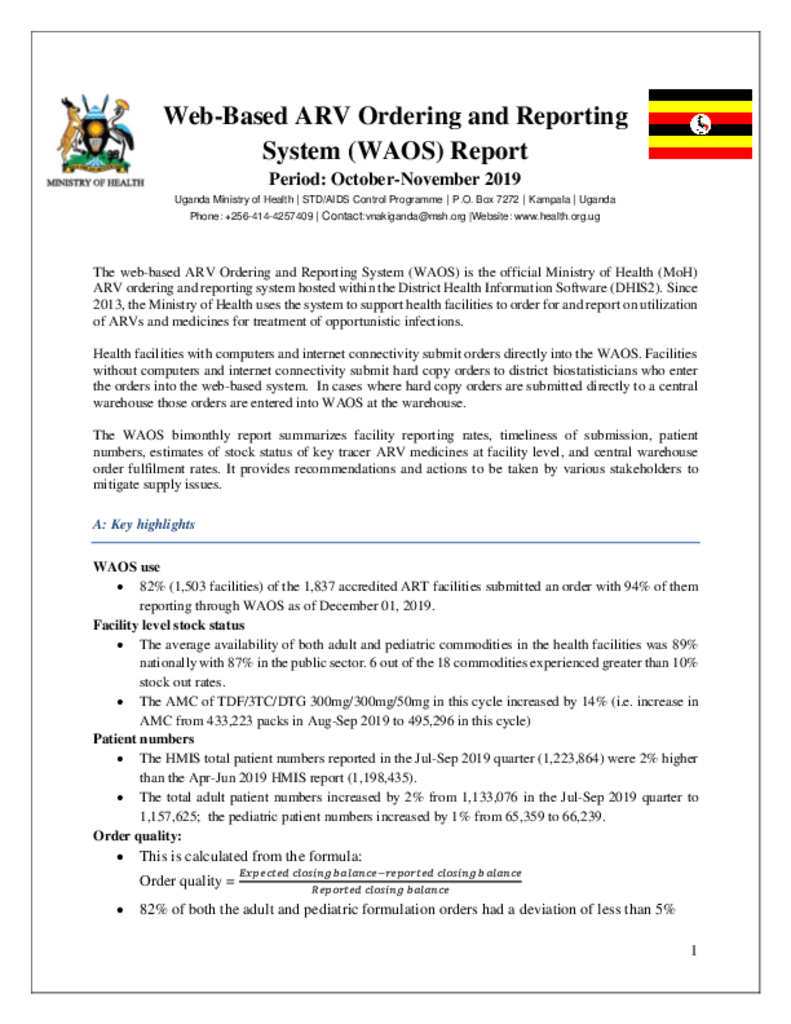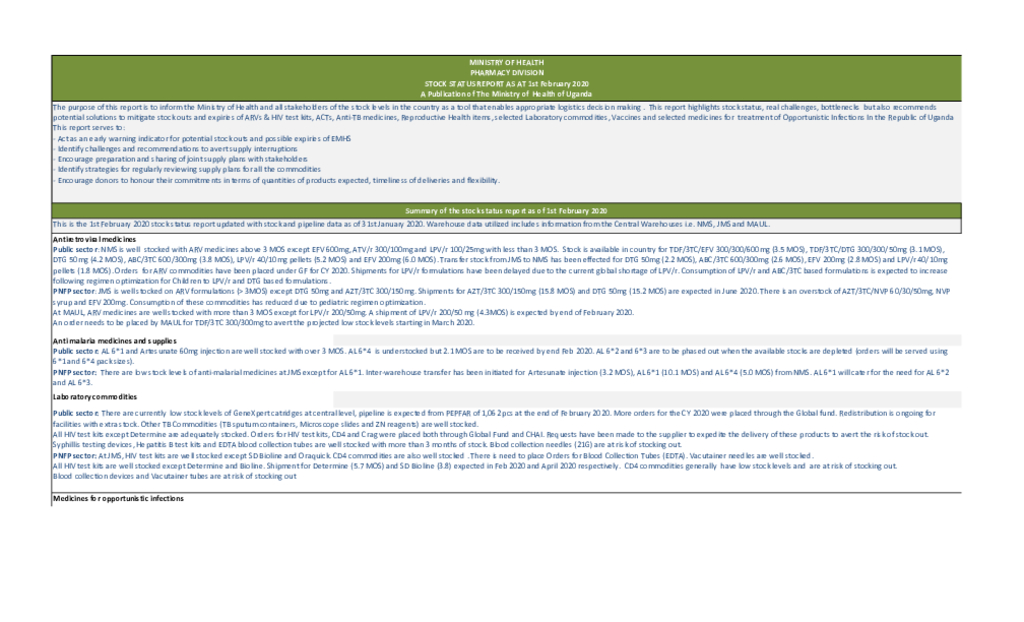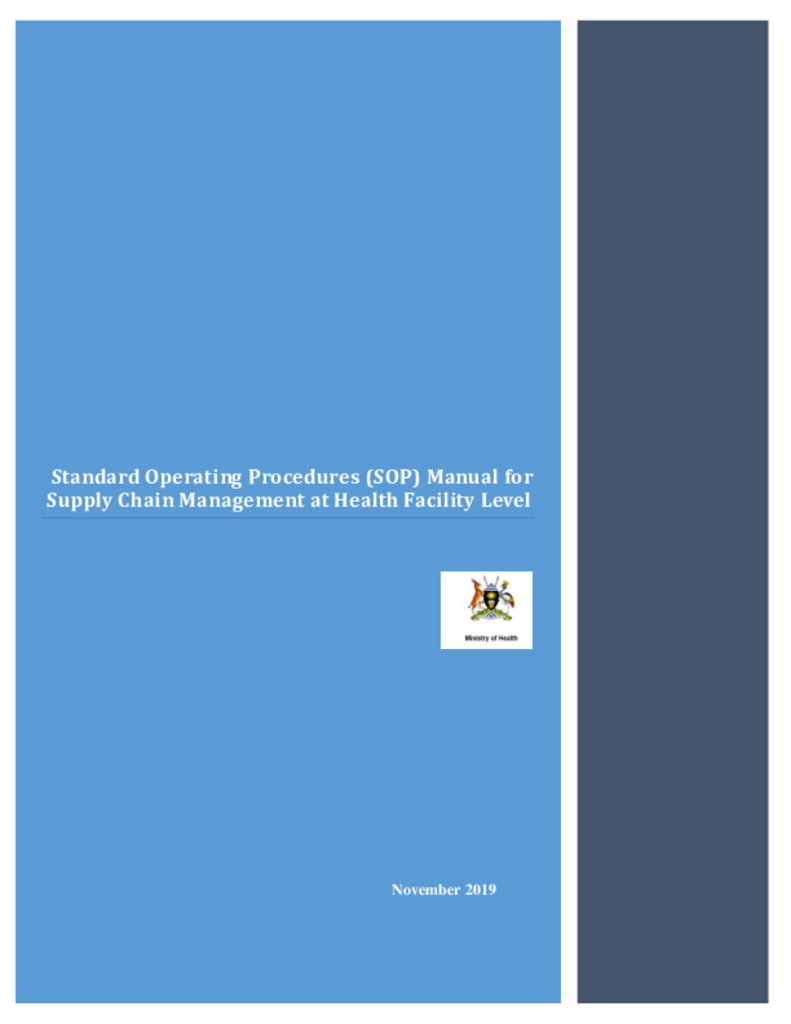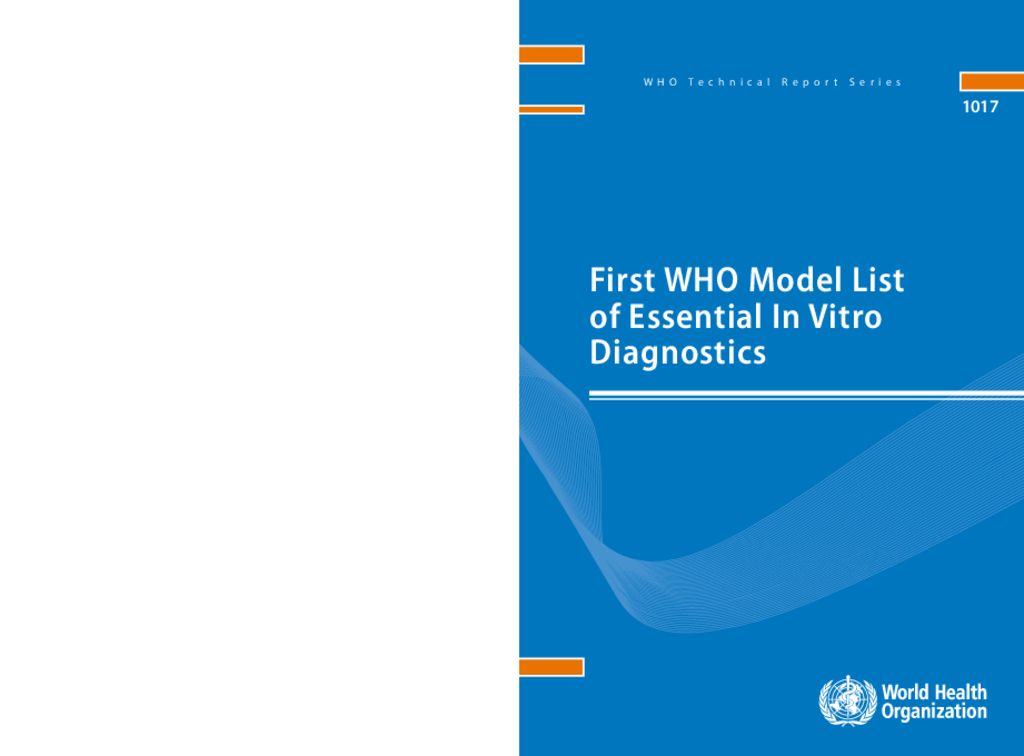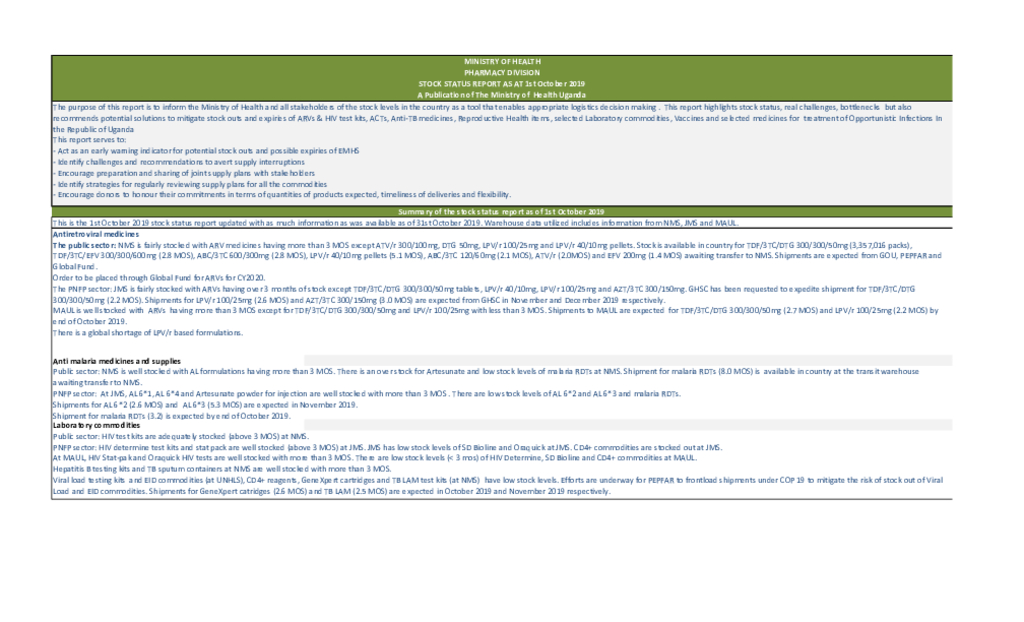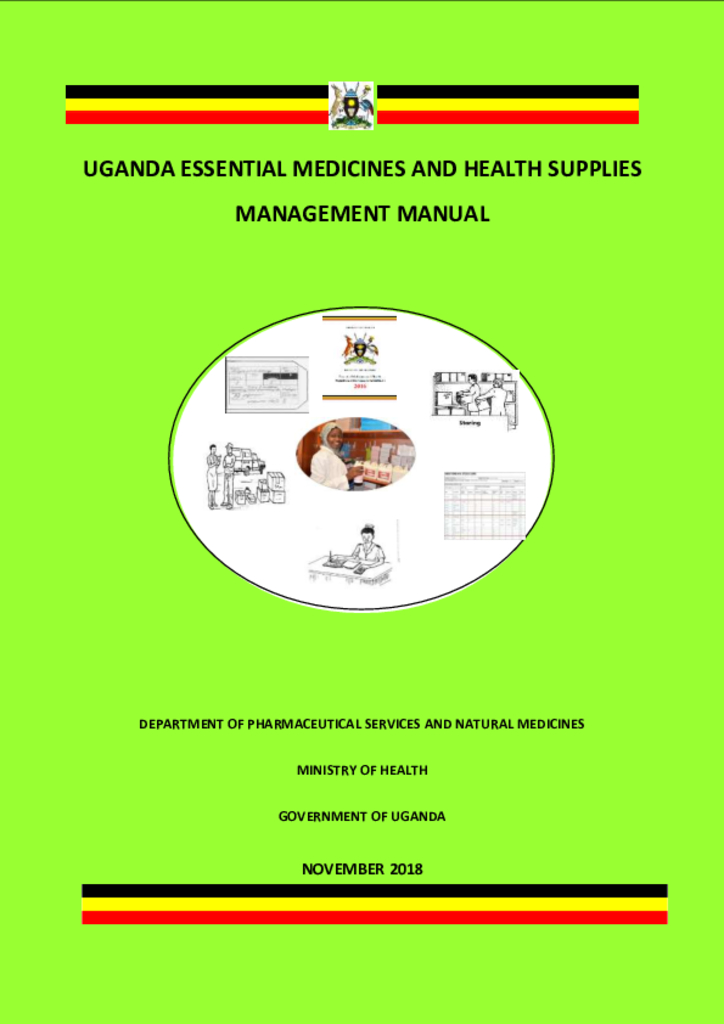The purpose of this report is to inform the Ministry of Health and all stakeholders of the stock levels in the country as a tool that enables appropriate logistics decision making. This report highlights stock status, real challenges, bottlenecks but also recommends potential solutions to mitigate stock outs and expiries of ARVs & HIV test kits, ACTs, Anti-TB medicines, Reproductive Health items, selected Laboratory commodities, Vaccines and selected medicines for treatment of Opportunistic Infections In the Republic of Uganda This report serves to: - Act as an early warning indicator for potential stock outs and possible expiries of EMHS - Identify challenges and recommendations to avert supply interruptions - Encourage preparation and sharing of joint supply plans with stakeholders - Identify strategies for regularly reviewing supply plans for all the commodities - Encourage donors to honour their commitments in terms of quantities of products expected, timeliness of deliveries and flexibility.
The purpose of this report is to inform the Ministry of Health and all stakeholders of the stock levels in the country as a tool that enables appropriate logistics decision making. This report highlights stock status, real challenges, bottlenecks but also recommends potential solutions to mitigate stock outs and expiries of ARVs & HIV test kits, ACTs, Anti-TB medicines, Reproductive Health items, selected Laboratory commodities, Vaccines and selected medicines for treatment of Opportunistic Infections In the Republic of Uganda This report serves to: - Act as an early warning indicator for potential stock outs and possible expiries of EMHS - Identify challenges and recommendations to avert supply interruptions - Encourage preparation and sharing of joint supply plans with stakeholders - Identify strategies for regularly reviewing supply plans for all the commodities - Encourage donors to honour their commitments in terms of quantities of products expected, timeliness of deliveries and flexibility
Public Sector: ARV medicines are well stocked except except TLE formulations, ABC/3TC 600/300mg, LPV/r 200/50mg and ABC/3TC 120/60mg. Stock is available incountry for TLD 90 pack (2.0 MOS) and DTG 50mg (13.6 MOS). Interwarehouse transfer of TLD 90 pack (1.3 MOS) and DTG from JMS to be effected in August 2020. Transition of women of reproductive age to TLD should be expedited to preserve stocks of TLE for those intolerant to/ineligible for TLD. Shipments of ABC/3TC 600/300mg (1.7 MOS) and ABC/3TC 120/60mg (4.1 MOS) are expected in September 2020. There has been delayed delivery of Abacavir based formulations due to shortage of API for Abacavir. Consumption of LPV/r 200/50mg is expected to decrease following transition of patients from PI regimens to DTG. Consumption of pediatric LPV/r formulations is expected to increase due to pediatric regimen optimization. PNFP sector: JMS is well stocked on ARVs (>3 MOS) except ABC/3TC 600/300mg and AZT/3TC 30/60mg. Shipments of AZT/3TC 30/60mg (5.5 MOS) and ABC/3TC 600/300mg (6.0 MOS) are expected in August and December 2020 respectively. MAUL is well stocked on ARVs ( > 3 MOS) except for TLD 90 pack, TDF/3TC 300/300mg and Nevirapine syrup. Shipments for Nevirapine syrup (11.6 MOS) and TLD 90 pack (3.2 MOS) are expected in August and September 2020 respectively. Additionally, a shipment of TDF/3TC 300/300mg (9.6 MOS) is expected from the global Fund PNFP gapfill in December 2020.
The purpose of this report is to inform the Ministry of Health and all stakeholders of the stock levels in the country as a tool that enables appropriate logistics decision making . This report highlights stock status, real challenges, bottlenecks but also recommends potential solutions to mitigate stock outs and expiries of ARVs & HIV test kits, ACTs, Anti-TB medicines, Reproductive Health items, selected Laboratory commodities, Vaccines and selected medicines for treatment of Opportunistic Infections In the Republic of Uganda This report serves to: - Act as an early warning indicator for potential stock outs and possible expiries of EMHS - Identify challenges and recommendations to avert supply interruptions - Encourage preparation and sharing of joint supply plans with stakeholders - Identify strategies for regularly reviewing supply plans for all the commodities - Encourage donors to honour their commitments in terms of quantities of products expected, timeliness of deliveries and flexibility
The purpose of this report is to inform the Ministry of Health and all stakeholders of the stock levels in the country as a tool that enables appropriate logistics decision making . This report highlights stock status, real challenges, bottlenecks but also recommends potential solutions to mitigate stock outs and expiries of ARVs & HIV test kits, ACTs, Anti-TB medicines, Reproductive Health items, selected Laboratory commodities, Vaccines and selected medicines for treatment of Opportunistic Infections In the Republic of Uganda This report serves to: - Act as an early warning indicator for potential stock outs and possible expiries of EMHS - Identify challenges and recommendations to avert supply interruptions - Encourage preparation and sharing of joint supply plans with stakeholders - Identify strategies for regularly reviewing supply plans for all the commodities - Encourage donors to honour their commitments in terms of quantities of products expected, timeliness of deliveries and flexibility.
The web-based ARV Ordering and Reporting System (WAOS) is the official Ministry of Health (MoH) ARV ordering and reporting system hosted within the District Health Information Software (DHIS2). Since 2013, the Ministry of Health uses the system to support health facilities to order for and report on utilization of ARVs and medicines for treatment of opportunistic infections. Health facilities with computers and internet connectivity submit orders directly into the WAOS. Facilities without computers and internet connectivity submit hard copy orders to district biostatisticians who enter the orders into the web-based system. In cases where hard copy orders are submitted directly to a central warehouse those orders are entered into WAOS at the warehouse.
Antiretroviral medicines Public sector: NMS is well stocked with ARV medicines above 3 MOS except EFV 600mg, ATV/r 300/100mg and LPV/r 100/25mg with less than 3 MOS. Stock is available in country for TDF/3TC/EFV 300/300/600mg (3.5 MOS), TDF/3TC/DTG 300/300/50mg (3.1 MOS), DTG 50mg (4.2 MOS), ABC/3TC 600/300mg (3.8 MOS), LPV/r 40/10mg pellets (5.2 MOS) and EFV 200mg (6.0 MOS). Transfer stock from JMS to NMS has been effected for DTG 50mg (2.2 MOS), ABC/3TC 600/300mg (2.6 MOS), EFV 200mg (2.8 MOS) and LPV/r 40/10mg pellets (1.8 MOS). Orders for ARV commodities have been placed under GF for CY 2020. Shipments for LPV/r formulations have been delayed due to the current global shortage of LPV/r. Consumption of LPV/r and ABC/3TC based formulations is expected to increase following regimen optimization for Children to LPV/r and DTG based formulations. PNFP sector: JMS is well stocked on ARV formulations (> 3MOS) except DTG 50mg and AZT/3TC 300/150mg. Shipments for AZT/3TC 300/150mg (15.8 MOS) and DTG 50mg (15.2 MOS) are expected in June 2020. There is an overstock of AZT/3TC/NVP 60/30/50mg, NVP syrup and EFV 200mg. Consumption of these commodities has reduced due to pediatric regimen optimization. At MAUL, ARV medicines are well stocked with more than 3 MOS except for LPV/r 200/50mg. A shipment of LPV/r 200/50 mg (4.3MOS) is expected by end of February 2020. An order needs to be placed by MAUL for TDF/3TC 300/300mg to avert the projected low stock levels starting in March 2020.
A standard operating procedure (SOP) is a set of systematic instructions compiled by an organization to help workers carry out complex routine operations. SOPs aim to achieve efficiency, quality output and uniformity of performance, while reducing miscommunication and failure to comply with regulations. They also help ease the process of handing over duties from one staff to another.
This report enables us to see for the first time that the number of people using tobacco in the world is declining, despite population growth. The number of male tobacco users, which previously was increasing every year, finally turned the corner in 2018 and is projected to decline each year from 2019 forward. For this projection to become reality, tobacco control efforts need to be reinforced, and in some countries accelerated, to prevent additional people falling victim to tobacco-related illnesses and death.
The three strategic priorities of WHO stated in its Thirteenth General Programme of Work 2019–2023 are to advance universal health coverage, address health emergencies and promote healthier populations (1). The WHO Model List of Essential Medicines contains the medications considered to be the most effective and safe to meet the most important needs in a health system, thus advancing these strategic priorities
The purpose of this report is to inform the Ministry of Health and all stakeholders of the stock levels in the country as a tool that enables appropriate logistics decision making . This report highlights stock status, real challenges, bottlenecks but also recommends potential solutions to mitigate stock outs and expiries of ARVs & HIV test kits, ACTs, Anti-TB medicines, Reproductive Health items, selected Laboratory commodities, Vaccines and selected medicines for treatment of Opportunistic Infections In the Republic of UgandaThis report serves to: - Act as an early warning indicator for potential stock outs and possible expiries of EMHS- Identify challenges and recommendations to avert supply interruptions- Encourage preparation and sharing of joint supply plans with stakeholders- Identify strategies for regularly reviewing supply plans for all the commodities - Encourage donors to honour their commitments in terms of quantities of products expected, timeliness of deliveries and flexibility
This manual describes how to manage supplies based on revised and harmonized tools. It will act as a reference guide for health workers and focus on basic principles of supply chain management. If properly followed, it will promote efficient stock control and ordering of all EMHS. Health workers at all levels of care in the public sector are encouraged to use the stock management system described herein
